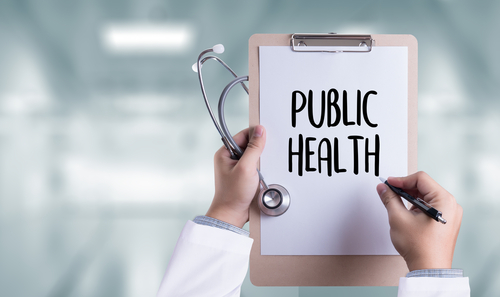
Career paths in public health are widely varied, with some jobs requiring only a bachelor’s degree in public health. However, to hold higher-level positions in more complex roles, a graduate degree is the preferred degree level. In making a decision of what area of public health and what public health degree to pursue, students should investigate what level of education needed for their desired position within the field. For those who want to pursue more specialized areas of public health, they may need to pursue a specific degree in their area of interest.
Associate’s Degree in Public Health
These two-year programs serve as an introduction to the field of public health, often covering only the basics of public health and may include general goals of public health works. Coursework may touch on state, federal and international laws. Most public health careers require more advanced degrees but an associate degree may suffice for some entry-level and administrative support positions and associate degrees credits can often be applied toward a bachelor’s degree
Where to Find Associate Degree Programs
Vocational schools and community colleges offer associate degree programs in public health for traditional high school students who recently graduated as well as adult learners. Most of these schools offer Associate of Applied Science (AAS) degrees, but some schools offer an Associate of Science (AS) program. Students have the chance to learn more about public health, which will help them if they transition to a bachelor’s degree program. Graduates also develop the skills necessary to work in some entry-level public health fields. Programs at this level of education generally include 60 credits of work and have some general education courses such as math and English.
Applying to a Public Health Associate Program
The schools that offer associate degree programs in public health make it easy for students to apply. They usually start with the application, which asks if they have a high school diploma. It also requires the student’s name and home address as well as a phone number and email address. Depending on the school, the application may have a small fee that students can pay with a credit card or debit card. Some schools will waive this fee for students who apply in-person on-campus. The school may also ask for a high school or GED transcript to make sure that the student is ready to begin the public health program.
Bachelor’s Degree in Public Health
A bachelor’s degree is considered the basic degree for careers in the field of public health and can lead many career options for graduates including social services, public health agencies in health education and environmental health. At the bachelor’s level, students are often given the opportunity to explore multiple specializations within the public health field. Public health schools may offer a bachelor of science or a bachelor of arts to its students.
Students seeking a bachelor’s in public health have three options. The first is a Bachelor of Science in Education (BSED). This is less common than the other degree types but allows students to study public health while learning about education. Bachelor of Science (B.S.) in Public Health programs are also available that include courses on epidemiology and other areas of science. Those courses are often available through the school’s department of kinesiology. Students can earn a Bachelor of Arts (B.A.) in Public Health too. Some schools also offer a Bachelor of Science in Nursing (BSN) with an emphasis on public health.
Applying to a Bachelor’s Program
Applying to a bachelor’s program in public health requires more work than applying to an associate degree program does. Though the programs accept students with either a high school diploma or GED, they will ask for more information from the students. Most programs require an official standardized test score and will accept either the ACT or SAT. According to The Princeton Review, a perfect SAT score is 1600. Students also need to complete the application and pay their application fees. They will then need to provide an official transcript. Some schools require a short essay that addresses why the applicant wants to study public health and what he or she will do with the degree.
Master’s Degree in Public Health
A master’s is the most common graduate degree required for higher level positions in the public health field with curriculum required five areas of study including: Biostatistics, Epidemiology, Environmental Health Sciences, Health Services Administration and Social and Behavioral Sciences. Most MPH degrees take an average of two years to complete although some specializations may be offered as one-year programs.
Master of Public Health Programs

Also called an MPH, a master’s degree in public health allows students to continue their studies and choose an emphasis area. Most programs include an applied practical experience such as a capstone or internship. Students spend several hundred hours working in a field that matches their degree plans. At the end of the experience, they may need to write a report that details what they learned and talks about their fieldwork. Schools will generally check with the student’s supervisor to make sure that they did the minimum amount of work required to earn their credits and graduate from the program.
Applying to an MPH Program
Students hoping to apply to an MPH program need to check with the schools that appeal to them as the programs have different requirements. A minimum of a bachelor’s degree is needed, but students can have a degree in nursing or another medical/health subject. If they do not have a background in public health, they’ll usually need to take more classes than their peers do. The application will include sections for the applicant to talk about any practical experiences they have and where they attended college. Students also need to submit transcripts that show they have college degrees and may need to provide a standardized test score.
Doctor of Public Health
The highest level of education in the field of public health is the doctorate of public health. Students enrolled in these programs are required to complete an intensive course of study to prepare them for careers in upper management and academia.
Doctor of Public Health Programs
With a Doctor of Public Health (DPH), graduates can work in research facilities as well as schools. Earning this type of degree can take as little as 2.5 years up to five years or longer. It depends on whether the student enrolls in a part-time or full-time program and their overall requirements. DPH students often do a teaching capstone in which they spend one semester up to one year teaching classes in the school. They will also create a dissertation that shows all of their experiences and education, which they submit to graduate from the program.
Applying to a DPH Program
The top DPH programs look for candidates who have a master’s degree in public health or a similar/related field. Though students can apply while they’re in a graduate program, they cannot start the doctoral program without first finishing their degrees. They need transcripts that clearly show all of the public health classes they took and the grades they earned in their courses. Some programs have a fieldwork requirement too that can range from four to six years. This ensures that students have some experience in the field that will help them in their classes. They also need to apply to the program and provide any information required of them.
4 + 1 Public Health Programs
Another option for students who want to study public health is a 4 + 1 program. Students start as undergrads and spend four years working on a B.S. degree. In their senior years, they have the option of taking classes through the graduate school. Some of the credits they earn will count towards both of their degrees. Enrolling in one of these programs will require that the student applies to the B.S. program first. If they do well in their classes, they can apply to the 4 + 1 track in their sophomore or junior years.
Are There Online Options?
Online programs allow students to study public health without leaving their homes. These programs are available at all levels and from some of the country’s top schools. The number of credits they need to take can range from 60 in an associate degree program to more than 120 in a bachelor’s degree program. Graduate and doctoral programs often have internships but allow students to look for opportunities in their cities. They can work with their schools to find internships or find internships and get approval from the school to work there. Online programs accept both full-time and part-time students.
Residency Requirements
Public health online degree programs may have a residency requirement for students enrolled in graduate and doctoral programs. This is similar to the residency that a doctor would do in medical school. During the residency, the student will spend time working in a health care facility such as a hospital or rehabilitation clinic. The work that they do must include a public health component. Students may use research materials to work on their dissertation or a thesis and gain some first-hand experience working with patients and medical professionals. A standard residency can last for a full year or longer.
Public Health Certificates
Schools today offer public health certificate programs that students can complete while working on a degree or instead of a degree. They can complete a certificate in as little as one semester, but most programs require two semesters of work. A popular choice is a certificate in child, youth and family health. This prepares students to work with patients and their families as well as children of different ages. With a certificate in aging or aging health, students can more easily work with the elderly and understand their needs. Toxicology is another available certificate that can assist those who want to work in emergency services. Other certificates include environmental health, epidemiology, kinesiology, public health policy and public health research.
Concentrations in Public Health

Bachelor’s and associate degree programs allow students to study the top areas of public health. They develop a strong understanding of those subjects, which can help them in the field and advanced programs. Most graduate and doctoral programs require that students choose one option from a list of concentrations. They will focus on those subjects in their degree programs. Public health management is one option that looks at how to lead and manage those working in a public health field. A concentration in epidemiology focuses more on the concepts of epidemiology and how students can prevent public health emergencies. Global health and public health leadership are among the other concentrations that students can choose.
Undergraduate Funding Options
Students can get help paying for a public health degree program based on their level of education and when they complete the Free Application for Federal Student Aid (FAFSA). Most students qualify as dependents and will need to use the tax records of their parents to file this form. It helps them qualify for financial aid that comes from both the state and federal government, including subsidized student loans and several types of grants. Subsidized loans help students graduate without owing large sums of money as the interest on those loans remains frozen until they leave school for six months or graduate. Undergrads can also qualify for work-study and find a position working on-campus or for a nearby employer.
Funding for Advanced Students
Graduate and doctoral programs in public health include other funding options for students who submit the FAFSA. Schools typically base their financial aid packages on the average cost of attendance compared to the amount that students can pay based on their answers on the form. They may qualify for scholarships that cover 50% of their cost of attendance up to the total amount that they need each year. Many graduate and doctoral programs hire students as assistants too. Called assistantships, these positions usually include a tuition waive and a stipend. While the waiver covers the cost of some or all of their classes, the stipend helps them pay for their living expenses. Students can work as teaching, research or graduate assistants. Traditional schools also hire older and advanced students in public health programs to work as dorm or resident advisors. Those jobs cover the cost of the student’s room and board.
Public Health Education

Public health touches upon almost every aspect of life and those with an education in public health have an opportunity to work in wide variety of settings including:
- The Public Sector in Government jobs that can include disaster preparedness, health department administration or public nursing
- Non-profits in careers focusing on the health disparities in populations including minorities or mothers
- Academia focusing on research or teaching students enrolled in public health-related degree programs
- In the private sector in insurance companies, pharmaceutical companies, in consulting or health care facilities.
Related Resources:
- Top 25 Most Affordable Online Master’s in Public Health
- Top 25 Online MPH Programs
- Top 35 Schools for a Graduate Degree in Public Health
- Top 50 Masters in Public Health Online
- What is the Accreditation I Should Look For in a School of Public Health?
- What is the Curriculum for a Master of Public Health Degree?
- What is the Difference Between a Master of Public Health and a Master of Health Administration?
- What is the Difference Between an MS in Public Health and an MS in Healthcare Management?
- Why Should I Pursue a Career in Public Health?